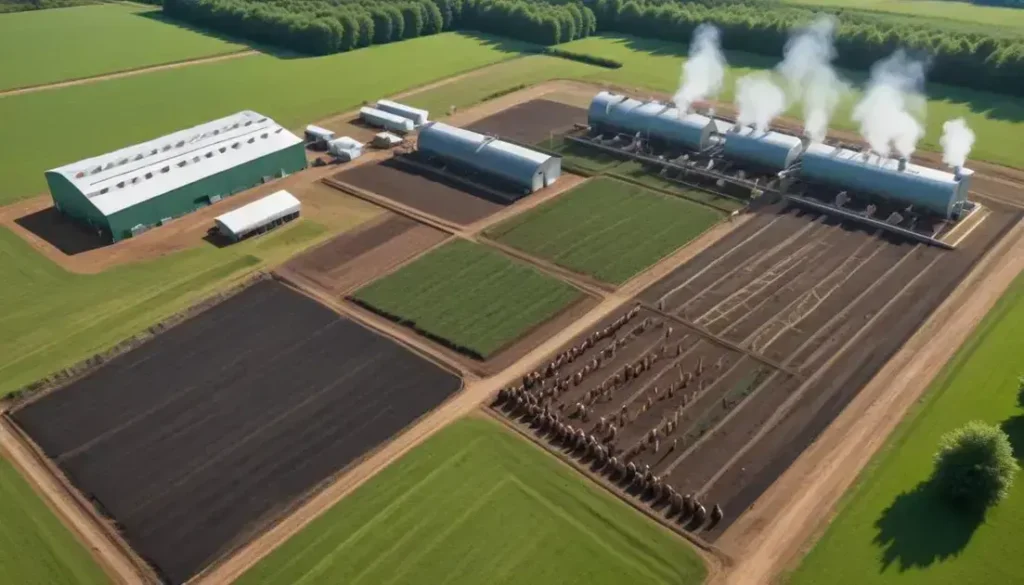The UK energy transition focuses on achieving sustainability by significantly increasing the use of renewable energy sources, integrating advanced technologies, and engaging communities to reduce carbon emissions and create a resilient energy system by 2030.
The **UK Energy Transition** is set to revolutionize the energy landscape, presenting both challenges and opportunities for businesses around the globe. Are you ready to explore how these changes could impact your operations?
Introduction to UK Energy Transition
A significant focus of the UK Energy Transition is the government’s commitment to reducing greenhouse gas emissions. By aiming for net-zero emissions by 2050, the UK is leading the charge towards a more sustainable future.
This transition involves a comprehensive overhaul of energy systems, transitioning away from fossil fuels to renewable energy sources. This approach not only targets cleaner air but also aims to enhance energy security and independence.
The inclusion of wind, solar, and hydro power is pivotal in this shift. The government is investing heavily in infrastructure to support these technologies, ensuring a stable and reliable energy supply.
Moreover, public engagement is essential for the success of energy reforms. The UK government has initiated campaigns to educate citizens about the benefits of sustainable energy use, encouraging households to adopt cleaner energy solutions.
Businesses, especially those in the energy sector, will need to adapt to this evolving landscape. Understanding new regulations and embracing innovative technologies will be crucial for staying competitive in this dynamic market.
Key government proposals
The UK government has introduced a series of pivotal proposals aimed at accelerating the transition towards a sustainable energy future. One of the primary initiatives is the increase in investment for renewable energy projects. This funding will support innovations in wind, solar, and bioenergy, fostering a diverse energy mix.
Another significant aspect is the establishment of stricter regulations and targets for carbon emissions. These regulations require industries to adopt more sustainable practices, pushing businesses to rethink their operational strategies.
Additionally, the government plans to expand electric vehicle (EV) infrastructure, making it easier for consumers to transition to cleaner transportation options. This infrastructure includes more charging stations and incentives for purchasing EVs.
The proposals also encompass support for energy efficiency programs in homes and businesses. By providing grants and subsidies, the government encourages energy-saving renovations and technologies, leading to reduced energy consumption.
Public engagement remains a focal point in these proposals. The government aims to involve communities in decision-making processes, ensuring transparency and support for large-scale energy projects. This collaborative approach can enhance public trust and facilitate smoother project rollouts.
Impact on electricity pricing
The transition to a renewable energy system in the UK is expected to significantly influence electricity pricing. As the government increases its investment in clean energy technologies, there will be implications for both consumers and businesses.
One of the primary effects of this transition is the potential for reduced costs in the long run. By relying more on solar and wind power, sources that have low operational costs, prices are likely to stabilize or even decrease over time.
However, in the short term, there may be fluctuations as the energy market adjusts to these changes. The implementation of new infrastructure requires substantial investment, which could initially lead to higher electricity prices. It is essential to consider these dynamics in forecasting future electricity costs.
Moreover, government policies encouraging energy efficiency and renewable energy adoption could provide consumers with incentives, helping to mitigate any immediate price increases. These incentives could foster a more resilient and sustainable energy market.
Additionally, the development of competitive markets around renewable energy will likely drive prices down as innovation progresses. As businesses compete to provide cleaner energy solutions, consumers may benefit from lower rates and enhanced service offerings.
Infrastructure upgrades needed
As the UK embarks on its energy transition, significant infrastructure upgrades are crucial to support this transformation. Modernising the existing energy grid is imperative to manage new renewable energy sources effectively. This includes enhancing grid connectivity and flexibility to accommodate various types of energy generation, such as solar and wave energy.
Another critical area of focus is the development of energy storage facilities. With the intermittent nature of renewable energy, robust storage solutions are necessary to ensure a reliable energy supply during peak demand periods. Investments in technologies like batteries and pumped hydro storage will play a vital role.
Moreover, improving existing transportation infrastructure for electric vehicles (EVs) is essential. Expanding charging networks across urban and rural areas will encourage consumers to transition from traditional vehicles to EVs. Government incentives to build more charging stations can stimulate private sector investment in this arena.
Furthermore, investment in smart technology is necessary to optimise energy consumption. Smart meters and home automation systems can help consumers monitor and manage their energy usage effectively, leading to reduced costs and environmental impact.
These infrastructure upgrades are not just about enhancing efficiency; they are a crucial step towards achieving a sustainable energy future and realising the UK’s ambitious climate goals.
Consumer support initiatives
Consumer support initiatives play a vital role in the success of the UK energy transition. These programs are designed to encourage public participation and promote the adoption of renewable energy technologies. By providing information and resources, the government aims to increase awareness about the benefits of clean energy.
One core aspect of these initiatives includes offering financial incentives, such as grants and subsidies. These financial supports help consumers invest in energy-efficient appliances, solar panels, and home renovation projects that aim to reduce energy consumption.
Educational campaigns are also crucial in changing consumer behavior. Through workshops and outreach programs, individuals learn how to manage their energy usage effectively. This not only lowers their energy bills but also decreases their carbon footprint.
Moreover, community engagement initiatives foster a collaborative spirit among residents. By organizing local energy clubs and partnerships, communities can share resources, knowledge, and best practices. This grassroots approach enhances the collective effort towards sustainability.
In addition to these measures, providing platforms for consumer feedback is essential. This feedback helps policymakers understand public concerns and adjust initiatives accordingly, ensuring they meet the needs of all stakeholders in the energy transition process.
Capgemini’s role in energy reform
Capgemini plays a pivotal role in the ongoing energy reform initiatives in the UK, providing essential support to businesses striving for sustainability. As a leading consulting firm, Capgemini integrates technological solutions with strategic insights to facilitate the transition to a cleaner energy future.
The firm specializes in digital transformation, helping energy companies adopt advanced technologies such as smart grids and data analytics. These tools enable firms to optimize their operations, enhance efficiency, and reduce emissions significantly. Capgemini’s expertise ensures that organizations can monitor their energy usage in real-time, leading to improved decision-making.
Additionally, Capgemini assists in navigating the complexities of regulatory frameworks. Their deep understanding of energy policies helps clients remain compliant while embracing innovative practices, ultimately fostering renewable energy deployment.
The firm also emphasizes collaboration, bringing together stakeholders from various sectors to develop holistic solutions. By creating partnerships between government entities, private companies, and environmental organizations, Capgemini maximizes the impact of energy initiatives.
Through its multifaceted approach, Capgemini not only drives efficiencies but also supports the overall vision of a sustainable energy landscape in the UK. Their commitment to environmental stewardship positions them as a key player in the energy sector’s reform efforts.
Opportunities for Indian exporters
The UK energy transition presents numerous opportunities for Indian exporters looking to expand their market presence. As the UK shifts towards renewable energy sources, there is an increasing demand for clean technology products and services. Indian firms that specialize in solar panels, wind turbines, and energy storage solutions can find lucrative markets.
One key area of opportunity lies in collaborative projects. Indian exporters can partner with UK companies to provide innovative technology and services that align with the UK’s sustainability goals. Such collaborations not only enhance product offerings but also enable knowledge transfer in advanced energy solutions.
Furthermore, Indian businesses can benefit from the UK government’s incentives for adopting renewable energy technologies. By meeting compliance standards and science-based targets, Indian exporters can position themselves as preferred suppliers in the thriving UK market.
Another promising avenue is the export of energy management systems. These systems help optimize energy consumption and increase efficiency in various sectors, making them attractive to UK industries aiming to reduce their carbon footprint.
With the global push for sustainability, Indian exporters are well-placed to contribute to and benefit from the UK energy transformation. Their role in providing high-quality, innovative solutions can significantly enhance trade relations and support sustainable growth in both markets.
Adapting to clean energy strategies
Adapting to clean energy strategies is crucial for businesses looking to thrive in the evolving energy landscape. As regulations tighten and sustainability becomes a priority, companies must pivot their operational practices to align with these new standards. This adaptation process begins with conducting thorough assessments of current energy usage and identifying inefficiencies.
Investing in renewable energy sources like solar and wind is a vital step for companies aiming to reduce their carbon footprint. Transitioning to these sources not only helps meet regulatory requirements but also provides long-term cost savings. By embracing clean energy, businesses can stabilize their energy costs and enhance operational resilience.
Training employees and fostering a culture of sustainability within the organization is equally important. Programs that educate staff on energy-efficient practices promote a cohesive approach to adopting clean technologies. This cultural shift can lead to innovative solutions and improved productivity as team members engage in sustainable practices.
Moreover, collaboration with stakeholders, including local governments and energy providers, can facilitate access to resources and information on best practices. Participation in community renewable energy projects not only contributes to local sustainability efforts but also strengthens business-community relationships.
In conclusion, adapting to clean energy strategies is not just about compliance; it reflects a proactive approach to securing a sustainable future while maintaining competitive advantage in the market.
Benefits of a digital energy system
The transition to a digital energy system offers numerous benefits that are crucial for enhancing energy efficiency and sustainability. One major advantage is the improved ability to monitor energy consumption in real-time. Digital technologies, such as smart meters and advanced analytics, allow consumers and businesses to track their energy usage more closely, leading to informed decisions about energy savings.
Another key benefit is the integration of renewable energy sources into the grid. A digital system facilitates the seamless incorporation of solar, wind, and other renewables, maximizing their potential and contributing to a lower carbon footprint. This adaptability is essential as the demand for clean energy continues to grow.
Furthermore, digital energy systems enhance grid reliability and resilience. By leveraging technologies like IoT (Internet of Things), operators can predict outages and manage energy flows more effectively. This proactive approach minimizes disruptions and maximizes service continuity for consumers.
The digital transformation also leads to cost reductions. By automating processes and optimizing operations, companies can lower their operational costs, enabling them to pass on savings to consumers.
Additionally, these systems support innovative pricing models. Time-of-use pricing and dynamic tariffs can provide financial incentives for consumers to use energy during off-peak hours, further promoting efficiency and sustainability.
Challenges in implementation
Implementing a digital energy system comes with a unique set of challenges that must be navigated carefully. One significant hurdle is the integration of legacy systems. Many companies still rely on traditional infrastructure, making it difficult to incorporate new technologies without significant overhauls or disruptions.
Data security and privacy are also pressing concerns. As digital systems collect and store vast amounts of data, ensuring the protection of consumer information from cyber threats is paramount. Companies must invest in strong cybersecurity measures and protocols to safeguard their networks.
Additionally, there may be a lack of skilled workforce capable of managing advanced digital systems. Training existing employees and hiring skilled professionals are necessary steps, but these practices require time and financial investment. This skill gap can slow the transition and limit the effectiveness of digital implementations.
Regulatory compliance is yet another challenge. Adhering to local, national, and international regulations regarding energy management can complicate the implementation process. Companies need to stay updated on these regulations to avoid fines and ensure that their operations remain compliant.
Finally, consumer resistance to change can pose a significant barrier. Many individuals and businesses are accustomed to traditional systems and may be hesitant to adopt new technologies. Effective communication about the benefits of digital energy systems is essential to encourage a smoother transition.
Future of UK energy by 2030
The future of the UK energy sector by 2030 promises significant advancements aimed at creating a sustainable and resilient energy landscape. By this time, the UK aims to achieve a substantial reduction in greenhouse gas emissions, aligning with its commitment to net-zero by 2050. A significant portion of this objective relies on the extensive deployment of renewable energy sources, particularly wind and solar.
Wind energy, especially offshore wind farms, is projected to play a pivotal role. The UK already leads globally in this area, and by 2030, the capacity is expected to double significantly, contributing to a cleaner grid. Solar power will also see considerable growth, supported by advancements in technology and decreasing costs.
Another critical aspect is the integration of smart grid technology and energy storage systems. These innovations will enable more efficient distribution and management of energy, allowing for better load balancing and reducing wastage.
Furthermore, electric vehicles (EVs) are set to become more prevalent, supported by enhanced charging infrastructure and incentives for consumers. This transition will be crucial in reducing emissions from the transportation sector.
By 2030, the UK energy landscape aims to be more decentralized as local energy production becomes increasingly common, empowering communities to contribute to energy solutions. Overall, the steps taken now will shape a sustainable, economical, and reliable energy future for the UK.
Conclusion: A roadmap for stakeholders
As stakeholders navigate the challenges and opportunities of the UK energy transition, a clear roadmap is essential for successful implementation. This roadmap must encompass various facets, including policy alignment, technology integration, and community engagement.
First, aligning policies with sustainability goals is crucial. Policymakers must create frameworks that support the adoption of renewable energy sources while incentivizing businesses to innovate and invest in cleaner technologies. Establishing clear regulations and guidelines can foster a supportive environment for all players in the energy sector.
Secondly, technology integration plays a significant role in facilitating the transition. Stakeholders should prioritize investments in smart grids, energy storage systems, and digital platforms that optimize energy management. Embracing these technologies enables efficient resource allocation and improves grid reliability.
Moreover, fostering community engagement is vital. Local communities should be included in the decision-making process, ensuring their needs and perspectives are considered. This approach not only builds trust but also encourages grassroots initiatives that contribute to sustainability goals.
Finally, constant evaluation and adaptation of strategies are necessary. Stakeholders must remain flexible, monitoring progress and adjusting frameworks as needed to respond to emerging challenges and opportunities. By following this roadmap, stakeholders can work collaboratively to achieve a sustainable energy future for the UK.
In Conclusion: Embracing a Sustainable Energy Future
The journey towards a sustainable energy future in the UK is filled with both challenges and opportunities. Stakeholders must work together, aligning policies, integrating advanced technologies, and engaging communities to make a significant impact.
As we look towards 2030, embracing renewable energy sources and adopting digital systems will be vital for reducing carbon footprints and enhancing energy efficiency. The collaborative efforts of businesses, government, and communities will ensure a reliable and clean energy grid.
By following the roadmap outlined in this content, stakeholders can navigate the complexities of the energy transition successfully. It’s essential to remain adaptable and open to innovative solutions that will shape the energy landscape.
In summary, the efforts we make today will pave the way for a sustainable and prosperous energy future for generations to come.
Frequently Asked Questions (FAQ)
What are the main benefits of transitioning to renewable energy in the UK?
Transitioning to renewable energy reduces greenhouse gas emissions, enhances energy security, and promotes economic growth through job creation in sustainable industries.
How can businesses and communities engage in the UK energy transition?
Businesses and communities can engage by participating in local renewable energy projects, providing feedback to policymakers, and adopting energy-efficient practices.
What role does technology play in the energy transition?
Technology facilitates the integration of renewable energy sources, optimizes energy management, and enhances grid reliability through smart systems and data analytics.
How can I monitor my energy consumption effectively?
Utilizing smart meters and energy management systems allows consumers to track their energy usage in real-time, helping them make informed decisions to improve efficiency.
What challenges might stakeholders face during the energy transition?
Stakeholders may encounter challenges such as integrating legacy systems, ensuring data security, and managing regulatory compliance while adopting new technologies.
What does the UK energy landscape look like by 2030?
By 2030, the UK aims for a cleaner energy landscape dominated by renewables, smart grid technologies, electric vehicles, and active community participation in energy generation.


